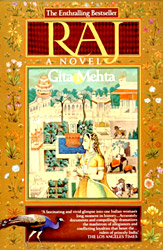The story of `the Raj` is somewhat different from the others. Jaya Singh is the intelligent, beautiful, and compassionate daughter of the Maharajah and Maharani of Balmer. At the death of her decadent Westernized husband Jaya has to assume the role of Regent Maharani of Sirpur. She overcome the thousand-year-old tradition of purdah, a strict regime of seclusion, silence, and submission and eventually she bravely fulfills her duty and soon finds herself into the center of a roiling political battle in which the future of the kingdom is at stake.
Born in Delhi in 1943 Gita Mehta was from a rich family who were directly involved in the Indian independence movement. Biju Patnaik who was one of the famous Indian freedom fighter and later became the major political leader of the Eastern state of Orissa was his father. After Mehta`s birth, her father was imprisoned for his political activity. She was consequently growing up surrounded by her parent`s active struggle for Indian liberation. At the age of three, she and her brother were sent to a boarding school while her mother followed her father from one jail to the next. Mehta was educated both in India and the United Kingdom. She is married to Ajai Singh Mehta who was her fellow student at Cambridge University. They fall in love and later got married. Mehta and her husband `Sonny,` the president of Alfred A. Knopf publishing house, currently maintain residences in New York, London and Delhi, spending at least three months of every year in India. As a result of Sonny Mehta`s prominent position in New York`s publishing industry, the couple is a central figure in New York`s literary publishing world. She blends humor with witty observations, constructing a book that presents her own impressions through the experiences of many.
Synopsis:
 In this book `The Raj` the author Gita Mehta demonstrates her extraordinary appreciation of the historical, political and cultural complexities of India, British and royal, under the Raj. She writes with realistic detail and subtlety about the period from Queen Victoria`s Diamond Jubilee to the violent and bloody civil wars for independence. Ms Mehta brings her characters, both fictional and real, to life. She gives the reader a firsthand view of a maharajah`s royal zenana, which is called as harem as well. In that place women in purdah are guarded by corrupt eunuchs and she takes us to the battlefields of WWI along with Indian Calvary warriors. We witness Mahatma Gandhi march to the sea, with hundreds of thousands of his countrymen, to break British laws against making salt. India`s struggle for independence and partition can be seen most vividly. This is seen from nationalist, royalist as well as British points of view. Gita Mehta brilliantly translates the cultural nuances and vividly sets her scenes of pageantry and poverty. The protagonist of this novel is Jaya Singh, the only daughter of the Maharajah and Maharani of Balmer. She was raised in the thousand year-old tradition of purdah by her mother and was educated exactly like her royal brother i.e. Balmer`s heir. This happened according to her father`s decision. She learned to play polo, hunt tiger and wild boar, and how to govern and lead. Jaya marries the jaded, westernized Maharajah of Sipur and finds herself in a history-making position. After the death of her husband she took the regime and very successfully holds the power.
In this book `The Raj` the author Gita Mehta demonstrates her extraordinary appreciation of the historical, political and cultural complexities of India, British and royal, under the Raj. She writes with realistic detail and subtlety about the period from Queen Victoria`s Diamond Jubilee to the violent and bloody civil wars for independence. Ms Mehta brings her characters, both fictional and real, to life. She gives the reader a firsthand view of a maharajah`s royal zenana, which is called as harem as well. In that place women in purdah are guarded by corrupt eunuchs and she takes us to the battlefields of WWI along with Indian Calvary warriors. We witness Mahatma Gandhi march to the sea, with hundreds of thousands of his countrymen, to break British laws against making salt. India`s struggle for independence and partition can be seen most vividly. This is seen from nationalist, royalist as well as British points of view. Gita Mehta brilliantly translates the cultural nuances and vividly sets her scenes of pageantry and poverty. The protagonist of this novel is Jaya Singh, the only daughter of the Maharajah and Maharani of Balmer. She was raised in the thousand year-old tradition of purdah by her mother and was educated exactly like her royal brother i.e. Balmer`s heir. This happened according to her father`s decision. She learned to play polo, hunt tiger and wild boar, and how to govern and lead. Jaya marries the jaded, westernized Maharajah of Sipur and finds herself in a history-making position. After the death of her husband she took the regime and very successfully holds the power.
Ballantine Books in the year of 1991 published the book `The Raj` written by Gita Mehta.



















